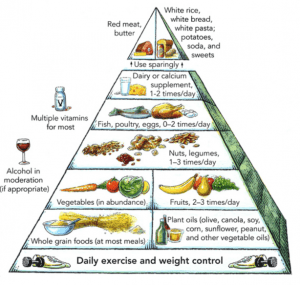Anahita Kodali, Medical Sciences, News, Summer 2020
Figure 1: The food pyramid describes the different foods and quantities that people should be eating on a daily basis. By analyzing the regular eating habits of patients, doctors can recommend ways of modifying a patient’s food consumption, potentially leading to numerous improvements in mental and physical health.
Image Source: Wikimedia Commons
Poor diet can lead to a variety of health issues. The most obvious are the risks of unhealthy weight gain and obesity while lesser known are the increased risks of several diseases, including heart disease, stroke, type II diabetes, certain cancers, osteoporosis, and tooth decay.1,2 Furthermore, poor nutrition can also cause mental health issues, like depression, and can potentially lead to the development of eating disorders.2 Given the numerous ill effects on overall well-being due to its absence, maintaining a healthy diet is of utmost importance for maintaining good physical and mental health. Doctors often emphasize the importance of eating a proper diet for this very reason. However, other than asking a couple of questions about what their patient’s daily diet looks like, there is no holistic assessment. Additionally, every doctor has a different way to ask their patients about their eating habits. This means the information logged into the electronic health record of a patient varies from doctor to doctor, increasing the difficulty of developing a standard method of diet evaluation based on patient health records.3
Despite the difficulty, developing standard and rapid methods for diet evaluation in doctor’s offices is of critical importance. A recent statement from the American Heart Association listed several reasons why current methods employed by doctor’s offices are not sufficient, including lack of training, time and integration of nutritional services into checkups.3 Dr. Maya Vadiveloo, chair of the group writing the statement, stated that “Dietary patterns and quality are not sufficiently prioritized when addressing modifiable risk factors during regular health care office visits.” Despite the issues with current screening methods, however, she believes that there are options to overcome the barriers to improving diet evaluation.4
Though the team did not endorse a specific tool that should be adopted on a larger scale, they did outline five key steps to creating an effective screening tool: it ought to use evidence-based approaches, assess complete dietary patterns, move at high speed, provide actionable next-steps to patients, and be able to track dietary change over time. They also highlighted future areas for study, including testing new screening tools on diverse groups and among specific patient and clinical populations. By being purposeful about testing, doctors will be able to better deal with unconscious biases in research data and therefore better serve all of their patients. They also believe a feasibility evaluation of implementation, including analysis of economic and logistical factors in clinical settings, will be critical to actually adopting new tools.3
In gaining a better understanding of their patients’ diets, doctors will be able to have a much clearer picture of their patients’ overall health and provide steps that may be taken to fix their diets. This will, in the long run, reduce the likelihood that people develop a host of physical and mental illnesses and allow them to lead healthier lifestyles.
Bibliography
[1] Poor Nutrition. (2020, April 14). https://www.cdc.gov/chronicdisease/resources/publications/factsheets/nutrition.htm.
[2] Government of South Australia. The Risks Of Poor Nutrition.
[3] Vadiveloo, M., Lichtenstein, A. H., Anderson, C., Aspry, K., Foraker, R., Griggs, S., … Thorndike, A. N. (2020). Rapid Diet Assessment Screening Tools for Cardiovascular Disease Risk Reduction Across Healthcare Settings: A Scientific Statement From the American Heart Association. Circulation: Cardiovascular Quality and Outcomes. https://doi.org/10.1161/hcq.0000000000000094
[4] American Heart Association. (2020, August 7). Experts urge evaluation of diet at routine check-ups. ScienceDaily. Retrieved August 7, 2020 from www.sciencedaily.com/releases/2020/08/200807093752.htm


Leave a Reply